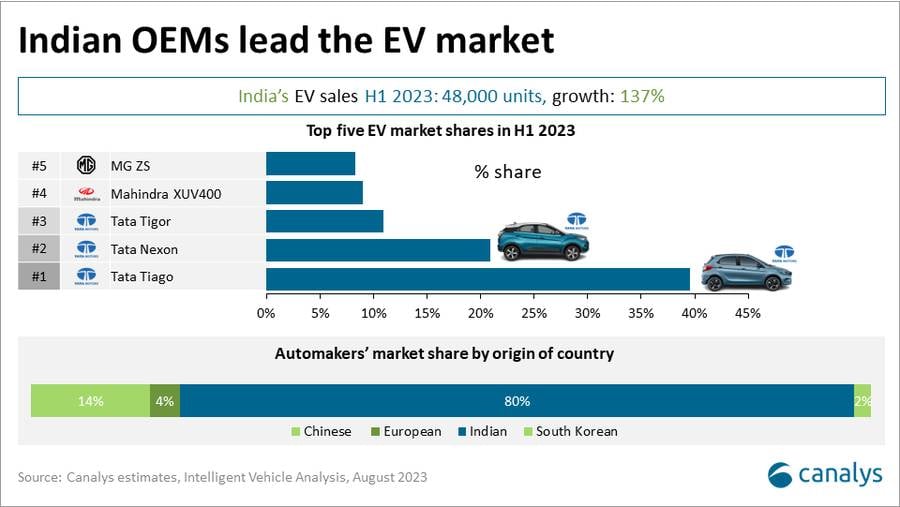India’s electric vehicle (EV) market saw a surge in sales in the first half of 2023, with the number of EVs sold doubling from the previous year. According to data from Canalys, a market research firm, 2 million light vehicles, including passenger cars and light commercial vehicles, were sold in India in the first half of 2023.
This is compared to 1.8 million units sold in the same period in 2022. Of the 2 million vehicles sold in the first half of 2023, 48,000 were EVs which accounts for a share of 2.4%. This represents a 137% year-on-year growth in EV sales.
Tata Motors dominates India’s EV market
Tata Motors dominated India’s electric vehicle market in the first half of 2023, selling 34,000 units and capturing a 72% share. The company’s Tiago, Nexon, and Tigor models were all among the top-selling EVs in India.

MG Motor and Mahindra were the second and third-best-selling EV brands in India, respectively, with 10.8% and 9% market shares. While Tata’s Tiago was the highest-selling EV car in India, followed by the Nexon and the Tigor, the Mahindra XUV400, and the MG ZS were the other two in the top five.
As per Canalys, MG Motors surpassed 10% market share in India’s EV market, largely due to the success of the MG ZS and MG Comet (also known as the MG Air). These two models gained traction in selected markets.
Mahindra also made a significant impact in the market, challenging Tata with its XUV 400. The XUV 400 secured a substantial 9% market share. Likewise, Citroen had a good showing with its eC3 EV, which achieved a 3.5% market share. This is a reflection of the positive market response to more affordable compact EVs.
On the other hand, BYD, a Chinese automaker that began delivering its Atto 3 electric SUV in India in early 2023, had a market share of 2.9% in the first half of the year. BYD had previously aimed to reach 30% of the Indian EV market by 2030, but its US$1 billion investment plan in India was reportedly withdrawn earlier this year amid India’s concerns over Chinese investments.
Hyundai also launched its second EV in India, the Ioniq 5. The Ioniq 5 shares the platform with the Kia EV6. Hyundai also announced that it will launch five EV models in India by 2032. Maruti Suzuki, India’s leading car manufacturer, said it will launch its first EV in 2024 and plans to launch six more models by 2030.
“Maruti is late with EVs, but its scale and ambition give it the potential to dramatically expand the size of the Indian EV market,” Canalys said.
“Despite increased competition in 2023, Canalys expects Tata to continue to dominate the market, with the Tiago remaining the most affordable EV in the market,” Ashwin Amberkar, Analyst at Canalys said.
Related:
- Tata to become first Indian iPhone manufacturer as Wistron deal nears completion
- Get Xiaomi Pad 6 Max 14-inch Tablet at a discounted price only at Giztop (Coupon)
- Xiaomi 14 to feature the same dual telephoto combination as Mix Fold 3
- Lei Jun says high-end smartphones are key to Xiaomi’s survival
- Xiaomi Mix Fold 3 will not release outside of China







